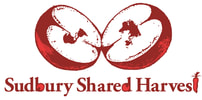Food Forests
Food Forests mimic woodland ecosystems using edible trees, shrubs, and other perennial plants. Fruit and nut trees make up the upper level, while berry shrubs and (mainly) edible perennials make up the lower levels.
Once established, food forests are relatively low maintenance. They don't require watering after the plants are established (usually the first growing season).
In early 2016 planning began for Sudbury's first community food forest. In May of 2017, volunteers led by Sudbury Shared Harvest began planting the Delki Dozzi Community Food Forest (phase 2 was planting in 2018).
Since then, we have worked with many groups and individuals to establish a number of much smaller food forests across the city.
To volunteer at a food forest other than Delki Dozzi, please send us an email and we'll connect you with the right people.

